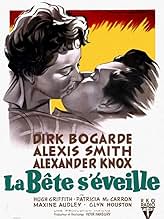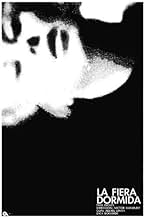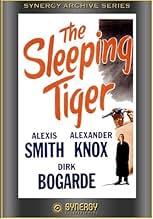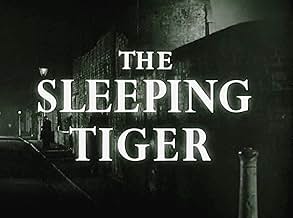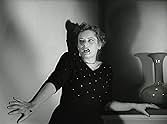AVALIAÇÃO DA IMDb
6,5/10
1,4 mil
SUA AVALIAÇÃO
Depois que um condenado entra na casa de um psicoterapeuta, ele concorda em iniciar uma reabilitação em vez de ser acusado pela polícia, mas tudo muda quando a esposa do terapeuta se apaixon... Ler tudoDepois que um condenado entra na casa de um psicoterapeuta, ele concorda em iniciar uma reabilitação em vez de ser acusado pela polícia, mas tudo muda quando a esposa do terapeuta se apaixona pelo condenado.Depois que um condenado entra na casa de um psicoterapeuta, ele concorda em iniciar uma reabilitação em vez de ser acusado pela polícia, mas tudo muda quando a esposa do terapeuta se apaixona pelo condenado.
- Direção
- Roteiristas
- Artistas
- Prêmios
- 1 indicação no total
Jimmy Charters
- Jazz Club Patron
- (não creditado)
Martin Lyder
- Jazz Club Patron
- (não creditado)
John Lynn
- Jazz Club Patron
- (não creditado)
Ross Parker
- Barman
- (não creditado)
Jim Tyson
- Jazz Club Patron
- (não creditado)
Harry Van Engel
- Spectator at crash
- (não creditado)
- Direção
- Roteiristas
- Elenco e equipe completos
- Produção, bilheteria e muito mais no IMDbPro
Avaliações em destaque
Even his staunchest devotees would have to acknowledge that the films of Joseph Losey are notoriously uneven. This one is of interest to Losey completists as it marks his first film in England although sadly, for reasons which have been well documented, both he and adaptors Foreman and Buchman were 'fronted' in the credits.
Losey has done his very best with the melodramatic material at his disposal and has given the film an edginess unusual for the time. There is a palpable sexual tension(surprisingly enough) between the psychotherapist's wife of Alexis Smith and the case for treatment of Dirk Bogarde. It must be said that Bogarde was never really convincing as a heart-throb and here relishes the chance to be menacing. Alexis Smith, cast for the American market, has an extremely challenging role which obliges her to run the gamut and being a thorough professional she surmounts whatever the script throws at her. Her character, like the film itself, goes off the rails at the end but I'm sure that Esso Oil was grateful for the free advertising. Mention must be made of Alexander Knox who navigates the psychobabble and delivers his customarily solid performance.
Whether Losey had a choice of composer for this is debatable but unlike most of his films in which the music is extremely irritating, Malcolm Arnold's powerful score here is spot on and aids the film immeasurably whilst Harry Waxman is a good choice as cinematographer, having previously shot 'Brighton Rock'.
This opus might not have represented the most auspicious start to the Losey/Bogarde collaboration but they could only get better and with the notable exception of 'Modesty Blaise', they most certainly did.
Losey has done his very best with the melodramatic material at his disposal and has given the film an edginess unusual for the time. There is a palpable sexual tension(surprisingly enough) between the psychotherapist's wife of Alexis Smith and the case for treatment of Dirk Bogarde. It must be said that Bogarde was never really convincing as a heart-throb and here relishes the chance to be menacing. Alexis Smith, cast for the American market, has an extremely challenging role which obliges her to run the gamut and being a thorough professional she surmounts whatever the script throws at her. Her character, like the film itself, goes off the rails at the end but I'm sure that Esso Oil was grateful for the free advertising. Mention must be made of Alexander Knox who navigates the psychobabble and delivers his customarily solid performance.
Whether Losey had a choice of composer for this is debatable but unlike most of his films in which the music is extremely irritating, Malcolm Arnold's powerful score here is spot on and aids the film immeasurably whilst Harry Waxman is a good choice as cinematographer, having previously shot 'Brighton Rock'.
This opus might not have represented the most auspicious start to the Losey/Bogarde collaboration but they could only get better and with the notable exception of 'Modesty Blaise', they most certainly did.
Alexis Smith was one of many American stars who came to the United Kingdom to
find work which was becoming less and less in Hollywood as less feature films were being made.. She was lucky to get this role opposite rising British cinema
favorite Dirk Bogarde.
Smith plays the wife of criminal psychologist Alexander Knox who believes that with some analysis some criminals can be cured. So far not different than those two Hollywood classics Blind Alley and The Dark Past. But in those cases criminals broke into the homes of psychologists Ralph Bellamy and Lee J. Cobb and under stress the two mental health professionals did some probing.
But Bogarde is a selected case study. He's paroled to Knox and gets to live in his home where Smith finds the sexy Bogarde impossible to resist.
Bogarde is Stanley Kowalski with a criminal record if this film had been made on this side of the pond Marlon Brando would have been an obvious choice for the part. Let's say that Knox should have kept his business and professional life separate. Smith is great as a forty something woman in some serious heat.
One person I always enjoy seeing in British films is Hugh Griffith who always brings something to even a relatively colorless part like a police inspector here.
Blacklisted director Joseph Losey directed The Sleeping Tiger and it's a fine piece of work
Smith plays the wife of criminal psychologist Alexander Knox who believes that with some analysis some criminals can be cured. So far not different than those two Hollywood classics Blind Alley and The Dark Past. But in those cases criminals broke into the homes of psychologists Ralph Bellamy and Lee J. Cobb and under stress the two mental health professionals did some probing.
But Bogarde is a selected case study. He's paroled to Knox and gets to live in his home where Smith finds the sexy Bogarde impossible to resist.
Bogarde is Stanley Kowalski with a criminal record if this film had been made on this side of the pond Marlon Brando would have been an obvious choice for the part. Let's say that Knox should have kept his business and professional life separate. Smith is great as a forty something woman in some serious heat.
One person I always enjoy seeing in British films is Hugh Griffith who always brings something to even a relatively colorless part like a police inspector here.
Blacklisted director Joseph Losey directed The Sleeping Tiger and it's a fine piece of work
The Sleeping Tiger is directed by Joseph Losey (using the alias Victor Hanbury) and adapted to screenplay by Derek Frye from the novel written by Maurice Moiseiwitswch. It stars Dirk Bogarde, Alexis Smith, Alexander Knox, Patricia McCarron, Maxine Audley and Hugh Griffith. Music is by Malcolm Arnold and cinematography by Harry Waxman.
When criminal Frank Clemmons (Bogarde) fails in his attempt to mug psychiatrist Dr. Clive Esmond (Knox), he is surprised to be invited to stay at the good doctor's house instead of going to prison. The doctor's motives are simple, he believes he can reform Frank whilst studying him at close quarters. Frank is only too happy to accept the offer, even more so when a relationship begins to form with Dr. Esmond's wife, Glenda (Smith). However, as passions stir and the tiger awakens, it's unlikely to end happily...
Blacklisted in Hollywood, Joseph Losey would find a home in the UK and produce some superb movies. The Sleeping Tiger has thematic links to two other great Losey movies, The Prowler (1951) and The Servant (1963), a sort of meat in the sandwich if you will. Dripping with psychologically redemptive sweat and pulsing with sexual frustrations, it's a film very much concerned with tightening the spring until it eventually explodes. And when it does it's well worth the wait, for there is no pandering to happy days endings, this has a kicker of a twist and it beats a black heart.
In the interim some patience is required as the key relationships at the centre of the plotting are steadily drawn, with Losey and Frye tantalising us with shards of character interest at regular intervals. Frank drifting on and off the rails livens proceedings, with the good doctor Esmond's loyalty putting some surprising spice in the story, while Frank's courting of Glenda (horse rides together, taking her dancing at a seedy jazz/blues club) and bullying of the maid, Sally (McCarron), keep us fascinated as to where this will end up.
Visually it's firmly in noir territory, more so in the first and last thirds, where Waxman (Brighton Rock) ensures shadows reflect the tonal shifts of plotting and the character's mental health. Arnold's (Academy Award Winner for The Bridge on the River Kwai) score is heavily jazz and blues influenced, mixing sorrowful beats with up-tempo thrums. Cast are excellent. Bogarde and Losey would compliment each other greatly and this is a good indicator of what would come during their five collaborations. Knox (Chase A Crooked Shadow) is wonderfully assured, while Smith (The Two Mrs. Carrolls) owns the movie with some deft changing of character gears.
The plot's a bit out there man, and Losey's slow teasing in the mid- sections may annoy those not familiar with his non American work. But this is very much a little ole devil worth seeking out. 7.5/10
When criminal Frank Clemmons (Bogarde) fails in his attempt to mug psychiatrist Dr. Clive Esmond (Knox), he is surprised to be invited to stay at the good doctor's house instead of going to prison. The doctor's motives are simple, he believes he can reform Frank whilst studying him at close quarters. Frank is only too happy to accept the offer, even more so when a relationship begins to form with Dr. Esmond's wife, Glenda (Smith). However, as passions stir and the tiger awakens, it's unlikely to end happily...
Blacklisted in Hollywood, Joseph Losey would find a home in the UK and produce some superb movies. The Sleeping Tiger has thematic links to two other great Losey movies, The Prowler (1951) and The Servant (1963), a sort of meat in the sandwich if you will. Dripping with psychologically redemptive sweat and pulsing with sexual frustrations, it's a film very much concerned with tightening the spring until it eventually explodes. And when it does it's well worth the wait, for there is no pandering to happy days endings, this has a kicker of a twist and it beats a black heart.
In the interim some patience is required as the key relationships at the centre of the plotting are steadily drawn, with Losey and Frye tantalising us with shards of character interest at regular intervals. Frank drifting on and off the rails livens proceedings, with the good doctor Esmond's loyalty putting some surprising spice in the story, while Frank's courting of Glenda (horse rides together, taking her dancing at a seedy jazz/blues club) and bullying of the maid, Sally (McCarron), keep us fascinated as to where this will end up.
Visually it's firmly in noir territory, more so in the first and last thirds, where Waxman (Brighton Rock) ensures shadows reflect the tonal shifts of plotting and the character's mental health. Arnold's (Academy Award Winner for The Bridge on the River Kwai) score is heavily jazz and blues influenced, mixing sorrowful beats with up-tempo thrums. Cast are excellent. Bogarde and Losey would compliment each other greatly and this is a good indicator of what would come during their five collaborations. Knox (Chase A Crooked Shadow) is wonderfully assured, while Smith (The Two Mrs. Carrolls) owns the movie with some deft changing of character gears.
The plot's a bit out there man, and Losey's slow teasing in the mid- sections may annoy those not familiar with his non American work. But this is very much a little ole devil worth seeking out. 7.5/10
An overdone psychodrama whose twists and turns require some unfortunate stretches.
Too bad the plot ironies finally drown in a tidal wave of over-emotion. Apparently, ace director Losey couldn't tone down Smith's carpet chewing finale that unfortunately overwhelms what's gone before. At the same time, we're hit over the head with the finale's sleeping tiger irony. I think the audience can put two and two together without that billboard contrivance.
Seems Glenda (Smith) is the highly repressed wife of coldly intellectual Dr. Clive (Knox), who's been neglecting her emotional needs as he pursues his writing and research. In that same pursuit he takes proven felon Frank (Bogarde) into his household in order to test his theory of criminal reform. Clive's main reform tool is to excuse Frank's misbehavior whether criminal or moral in order to get at the causes of Frank's disordered psyche. Needless to say, such indulgences cause all kinds of problems, both inside the household and out.
As Doc's indulgences mount, it seems that an optimistic ideal is being mocked. Namely, that there are no bad people, only mistreated kids who then grow into criminal behavior. For example, while in the Doc's "care", Frank robs a jewelry store, and maybe worse, spits on Clive's generosity by seducing wife Glenda. In return, the Doc simply ignores the mounting transgressions. To me, that willingness, which also puts people in Doc's community in danger, looks like a mockery of a liberal brand of Freudianism then in vogue. It may be a provocative idea for the film to play with. Nonetheless, the tiger upshot undercuts that optimism, at the same time it clouds the film's one very real tragedy.
Anyway, Bogarde comes through with a nicely modulated turn, while Knox deadpans through thick and thin, even as Smith does the sleeping tiger to an ear-splitting roar. Apparently the movie was filmed more cheaply abroad at a time when TV was eating into movie profits. So, on a small budget, don't expect much in terms of scenery or action, though noir master Losey does work in some atmosphere. To me, the story's highlight and genuine tragedy is downplayed, but is present nevertheless if you think about it. As the 90-minutes stands, it's something of a disappointment given the talent involved.
(In passing-depending on the camera angle there are times when it appears Frank and Glenda resemble Lucy and Desi from TV's iconic I Love Lucy. Then again, maybe I had one too many beers!)
Too bad the plot ironies finally drown in a tidal wave of over-emotion. Apparently, ace director Losey couldn't tone down Smith's carpet chewing finale that unfortunately overwhelms what's gone before. At the same time, we're hit over the head with the finale's sleeping tiger irony. I think the audience can put two and two together without that billboard contrivance.
Seems Glenda (Smith) is the highly repressed wife of coldly intellectual Dr. Clive (Knox), who's been neglecting her emotional needs as he pursues his writing and research. In that same pursuit he takes proven felon Frank (Bogarde) into his household in order to test his theory of criminal reform. Clive's main reform tool is to excuse Frank's misbehavior whether criminal or moral in order to get at the causes of Frank's disordered psyche. Needless to say, such indulgences cause all kinds of problems, both inside the household and out.
As Doc's indulgences mount, it seems that an optimistic ideal is being mocked. Namely, that there are no bad people, only mistreated kids who then grow into criminal behavior. For example, while in the Doc's "care", Frank robs a jewelry store, and maybe worse, spits on Clive's generosity by seducing wife Glenda. In return, the Doc simply ignores the mounting transgressions. To me, that willingness, which also puts people in Doc's community in danger, looks like a mockery of a liberal brand of Freudianism then in vogue. It may be a provocative idea for the film to play with. Nonetheless, the tiger upshot undercuts that optimism, at the same time it clouds the film's one very real tragedy.
Anyway, Bogarde comes through with a nicely modulated turn, while Knox deadpans through thick and thin, even as Smith does the sleeping tiger to an ear-splitting roar. Apparently the movie was filmed more cheaply abroad at a time when TV was eating into movie profits. So, on a small budget, don't expect much in terms of scenery or action, though noir master Losey does work in some atmosphere. To me, the story's highlight and genuine tragedy is downplayed, but is present nevertheless if you think about it. As the 90-minutes stands, it's something of a disappointment given the talent involved.
(In passing-depending on the camera angle there are times when it appears Frank and Glenda resemble Lucy and Desi from TV's iconic I Love Lucy. Then again, maybe I had one too many beers!)
It's just a bit too much. The good doctor is attacked at gunpoint. He disarms the bad guy, then brings him home to dinner, where his high strung wife spars with the guy. Of course, the two eventually begin a movie long tryst. Dirk Bogarde is a bad boy who is a bundle of anger. He usually gets what he wants but carries more baggage than a porter at an airport. Alexis Smith is the femme fatale. She is older and bored with her psychologist husband, who is determined to resurrect the lad. He is willing to allow this man to do whatever he wants: bringing women to the house, bossing around the help, robbing jewelry stores and businesses. He is pursued by a cop who is on to him but has respect for the doctor and backs off on an arrest. It's hard to believe that this man should give a rip about Bogarde, but somehow he's willing to withdraw. The weakest part of the movie is when it all falls into place. It's so pat. A contemporary film would have built the house a card at a time; this happens in milliseconds. Then we have the denouement which I will not spoil. Let me just say it was a disappointment. The movie is visually sharp and the acting is pretty good. I never really like Alexis Smith much and she is a little grating here. Still, it's a decent performance and the subject is a little ahead of its time.
Você sabia?
- CuriosidadesWhen this movie first appeared, the direction was credited to Victor Hanbury, a real-life Producer, who only agreed to take the credit when the actual Director, the blacklisted Joseph Losey, insisted that this would be a great help to him, as he needed the work. Although several versions of this movie, including the DVD, still credit Hanbury, there are prints where Losey is credited under his own name. The first several times it was shown on British television, in the late 1960s and early 1970s, Losey had the credit.
- Erros de gravaçãoAngry that Frank has left her Glenda wearing a black dress runs from the house, jumps in her car and drives off. Spotting Frank (Dirk Bogarde) walking along the road she stops and picks him up but she's now wearing a coat.
- Citações
Glenda Esmond: You're not going to give me notice, like a servant or a waitress!
- ConexõesFeatured in Joseph Losey: The Man with Four Names (1998)
Principais escolhas
Faça login para avaliar e ver a lista de recomendações personalizadas
- How long is The Sleeping Tiger?Fornecido pela Alexa
Detalhes
- Data de lançamento
- Países de origem
- Idioma
- Também conhecido como
- The Sleeping Tiger
- Locações de filme
- William Mansell, 24 Connaught Street, Londres, Inglaterra, Reino Unido(Smash & Grab 27 minutes from start)
- Empresas de produção
- Consulte mais créditos da empresa na IMDbPro
- Tempo de duração
- 1 h 29 min(89 min)
- Cor
- Proporção
- 1.37 : 1
Contribua para esta página
Sugerir uma alteração ou adicionar conteúdo ausente

